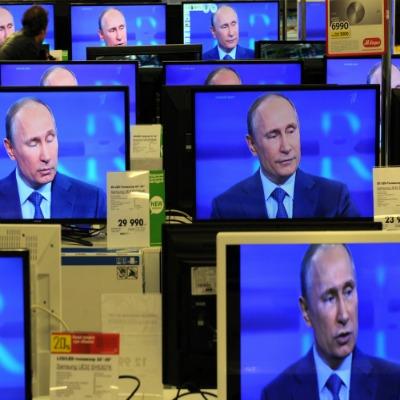BROOKE GLADSTONE: From WNYC in New York, this is On the Media. I'm Brooke Gladstone.
BOB GARFIELD: And I'm Bob Garfield. There is, at the moment, no shooting war in Ukraine. Russia’s annexation of Crimea has ‘til now been accomplished with negligible resistance. There is, however, a full-blown propaganda war in progress, waged by the Kremlin with eerily familiar weapons of mass deception – big lies.
[CLIPS]:
CORRESPONDENT: Putin claimed Ukrainians are living in terror.
BOB GARFIELD: And staged incidents.
CORRESPONDENT: Among the pro-Russia protests in Ukraine, growing evidence of protest tourists –
BOB GARFIELD: All playing to what, for Russians, is a resonant historical truth.
CORRESPONDENT: In an emotional speech, Putin said Ukraine’s Crimean Peninsula has always been an integral part of Russia in the hearts and minds of people.
[END CLIPS]
BOB GARFIELD: While Western audiences may dismiss Vladimir Putin’s fabrications as transparent and even primitive, the majority of Russians have embraced Russia's annexation of Crimea as a historic rescue mission. Michael Idov, editor-in-chief of GQ Russia, says the blunt propaganda tactics are intended to bolster one master narrative that’s been building for years.
MICHAEL IDOV: It’s basically Russia as a besieged fortress, beset on all sides by enemies. Once you’ve established that, all you need to prove is that the people who came to power in Ukraine are fascists, and fascist is the scariest of the scary words for the Russian psyche, which is still heavily scarred by World War II. And then that immediately becomes a pretext for liberating the Crimeans from the terrible fascist regime established in Kiev.
I sound like I’m exaggerating, but I’m not. I’m reading an official statement by the Russian Foreign Ministry that calls what happened in Kiev “a Nazi coup.”
BOB GARFIELD: Now, here in the West, we have seen reported no evidence of violence against Ethnic Russians or any kind of the siege that the Kremlin is describing. Have any such episodes been reported that seem credible to you?
MICHAEL IDOV: There have been a few skirmishes but here’s the scary part. We now have a chicken and egg problem because if you introduce vehement anti-Ukrainian sentiment and you rile up a population this way, through mass media and then through introducing rumors and staging events, then that leads to a very real and actually grassroots anti-Russian sentiment, which does [LAUGHS] create the situations that you then have to react against. So it’s an incredibly dangerous game that they’re playing.
BOB GARFIELD: On Russian TV, for example, and Russian newspapers, has there been any counter narrative or any evidence of an internal debate?
MICHAEL IDOV: Well, there’s no room left for the other side of the story because we’re in the midst of a very swift and very effective removal of all dissent from mass media. A couple of weeks ago, Lenta, one of the leading, if not the leading independent online user services, lost its editor-in-chief and a Kremlin flunky has been put in her place. And the only remaining independent TV channel, Dozhd, or Rain TV, has been told that their lease is not going to be renewed.
There’s no platform for any real conversation about the propriety of this, other than Facebook and Twitter, which are miraculously still open.
BOB GARFIELD: I’m wondering how various sections of the Russian population are processing all of this. Some of the Kremlin’s representations are transparent lies, beginning I guess with the soldiers without any insignias on their uniforms showing up in Crimea and Putin denying any knowledge of them. What's a Russian to think?
MICHAEL IDOV: Well, if you know the way the Russian mind operates, it’s not really about the rule of law, it’s about the spiritual truth or “truthiness,” in Stephen Colbert terms. And the truthiness of this situation is that the Crimea has historically been Russian and most Russians are ecstatic to receive it back, through whatever means. You know, it’s about restoring Russia’s greatness. You can see it in the skyrocketing approval rating that Putin is enjoying right now.
Not all of this is because of this disinformation campaign. People are also happy to see Russia throw its weight around. Unfortunately, it’s been so infantilized and condescended to in the nineties that the Russians are ecstatic to be the bully. They love it!
BOB GARFIELD: But if it’s all shadow puppetry, the Russian people, no matter how humiliated they may feel about 20th-century wrongs, they’re not stupid. Can they not see through what is being paraded before them?
MICHAEL IDOV: People don’t tend to see through lies when lies support the biases that they already hold. And this is true not only for Russians, it’s true for everyone. That’s true for the Americans when we went to war with Iraq.
Here I need to point out that there is very real and very authentic pro-Russian sentiment in the Crimea and Eastern Ukraine. A lot of what you’ve been seeing has, in fact, been championed by people on both sides of the border.
What’s amazing is that the average Russian who’s cheering the return of the Great Empire – “Alaska is next,” this is one of their favorite, you know, jokes that’s not quite a joke – what’s amazing is they don’t quite understand that an average Russian [LAUGHS] does not gain anything from it.
The only thing that already has changed is all this commotion has proved ruinous to the ruble. The dollar and the euro are trading incredibly high right now, and so for a country that imports most of its consumer goods, most of the things in stores have already appreciated by 15 percent or more. So that’s something that’s going to hit the Russians pretty hard, and that’s the price you pay for the return to the supposed theoretical imperial greatness.
BOB GARFIELD: Michael, thank you so much.
MICHAEL IDOV: Thank you, Bob.
BOB GARFIELD: Michael Idov is editor-in-chief of GQ Russia. He spoke to us from Moscow.
